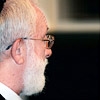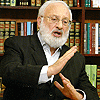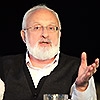 Question: What does “There is none else besides Him” mean? And how do people with the point in the heart, without the point in the heart, and the religious masses attain Him?
Question: What does “There is none else besides Him” mean? And how do people with the point in the heart, without the point in the heart, and the religious masses attain Him?
Answer: People existing in our world can relate to the whole of reality just as to the environment in which they live, similar to all living beings. Besides that, people can have an additional relationship to their life that animals do not have. If a person was taught to believe in the upper force, this relationship can be either good or evil. If you are good, the upper force will be good to you, and if you are bad, it will be evil to you. This force wants you to be good and thus sends challenges to you. It treats you with kindness if you behave well. So, it is worth being good.
What does it mean to be “good” in the eyes of the upper force? Here, people have invented various systems to the point of sacrificing their own children and annihilating infidels in religious wars. Coming from their ego, people created for themselves all kinds of relations to this upper force.
Baal HaSulam explains the origin of religions and beliefs in his article “The Peace.” In essence, religions are a system for the development of humans, advancing them to spirituality. Those layers of desires to enjoy which are not able to aspire to the Creator move ahead with the help of religions. People know one thing only: There is the upper force, and we are in a certain system of relationship with it: If I am good, it is kind; if I am bad, it is evil.
Then, the sole problem is to define the desires of this upper force. Every religion has its own view on this matter, and each considers itself the right one. And here is all the difference between the religions: how to worship this upper force, how to fulfill its desires so we can live comfortably in this world and in the future world. They seem to work in front of this upper force like in front of the lord, the king: “How can we fulfill Him so He is pleased with us?”
Thus, there are three types of people:
- Entirely secular with an animal’s attitude towards reality
- Religious who worship the upper force, trying to find the ways to please it
- Kabbalists
Kabbalists say that this upper force, the Creator, has no relations with you personally. Even if you say that there is none else besides Him, the good who does good, it is an all-embracing power.
Everything depends on me, and He has no personal relationship with me. Everything is determined by the measure of my transformation in simple, constant, unchangeable existing Light, as it is said: “I did not change my HaVaYaH,” “the Law was given and cannot be transgressed.”
This means that the Creator has no personal relationship with me, has no calculations with respect to me, nothing! I simply feel that He does. But I perceive a computer just the same way. Let’s say, I was working on the computer yesterday and got angry with it in earnest, was ready to smash it with a hammer. Was it its fault? It is a gadget made of steel and plastic.
However, since I work with it, I transfer my personal qualities onto it, think of its behavior as good or bad, and fume at it: “Look what it has done to me!” Similarly, I get angry with a car if something happens to it.
These are fundamental things inherent in our nature. This is not funny at all. Our belief in the power of nature, which treats me kindly or unkindly, stems from here. What do we tell a child when he hits himself on a table? “Hit it back; it has hurt you!” And if it is not a table, but something more abstract, large and all-encompassing, we speak in a different way: “Treat Him well, and He will do you good.” Faith starts from here.
We don’t understand yet that if we are not at the point of truth, we don’t work with anything. We merely work against the law of nature, as “the law was given and cannot be transgressed.” The Creator doesn’t change. Thus, whether I am good or bad, it affects only me. I don’t do to the Creator either good or bad; I don’t touch Him.
When I say that He is happy for me or I make Him sad, it is I who says this. I just perceive this in my senses. If so, what or who makes me change? My ego? It means that I do this only with the purpose of feeling good. Nothing else obliges me! Or maybe the environment, threatening me with punishment, forces me to change?
If this is our attitude towards the entire, perfect reality, no one can force me to change. It can happen only by faith above reason! Why do I exist in this broken, false reality? I want to build from it an independent attitude towards this force, “the good who does good,” the only existing one. What does “an independent attitude” mean? It means that I relate to this force without any personal goal, and it doesn’t know, understand, or sense anything from me. What do I base my work on? “He hangs the Earth upon nothing,” which is called “ten Sefirot Blima (concealing).”
Gradually, I come to such perception of reality that I don’t make any personal calculations, like I make today. I just want to learn from this force its property, become similar to Him. This is my reward. I need no result, neither for the force, nor for myself; I desire only to become like Him, as it is said: “The reward for a commandment is to know the One who commands.”
These are very subtle concepts that are impossible to explain. A person who has no point in the heart will never be impressed by this or understand what is hidden behind. “For whom do I work then? If there is nobody but me who would receive my work and, as a result, treat me differently, it means that I work against the wall, against the void. Then, what do these words mean: “The book is open, and the hand is writing,” “sentences himself and the world to a scale of merit?”
All these words are intended to bring us closer to the ideal, which is called “faith above reason.” There, you don’t have any calculations that you can imagine. You have no one to address. You can make calculations only with the one who has desire, strength, and action. “There is none else besides Him” and “the good who does good” implies that He doesn’t act from the other side. We talk about our actions: changes of states, reactions, but He doesn’t have anything. If so, it’s as if He doesn’t act. He doesn’t seem live if He doesn’t change. This is how it appears to us.
[42107]
From the 1st part of the Daily Kabbalah Lesson 4/26/2011, Shamati No. 1
Related Material:
A Black Point In An Ocean Of Goodness
My Beloved Is Hiding From Me
125 Degrees Of Drawing Closer To The Light
Filed under: Daily Kabbalah Lesson, Inner Work, Religion, Spirituality - No Comments →
 Question: What is the use of studying The Book of Zohar if I discover that I am merely trying to run away from my earthly problems?
Question: What is the use of studying The Book of Zohar if I discover that I am merely trying to run away from my earthly problems?









